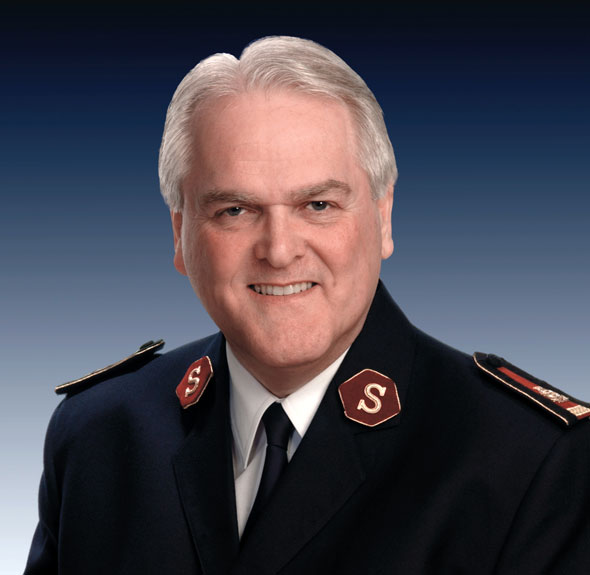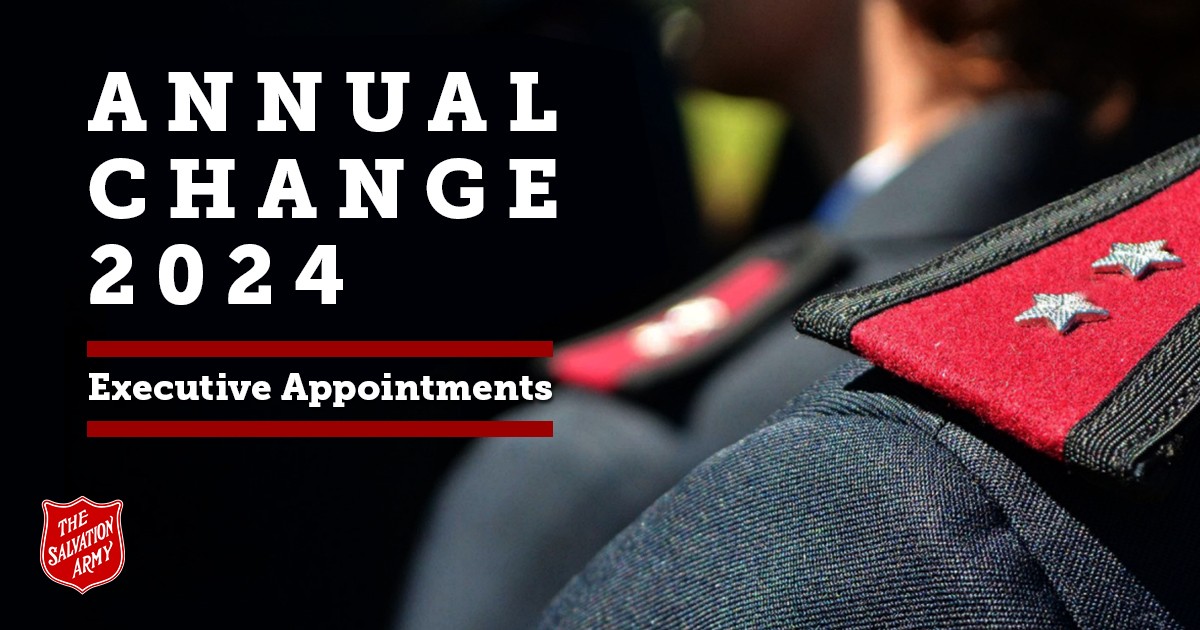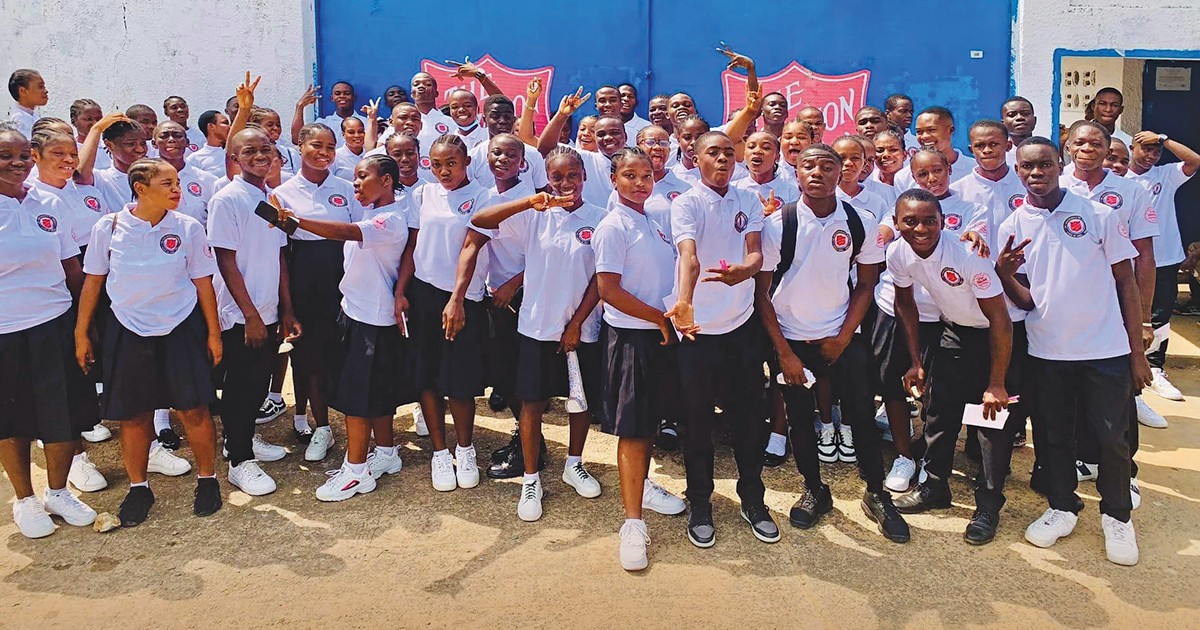 As the world leader of The Salvation Army, General Shaw Clifton gives overall direction, develops international policy and ensures the integrity of the Movement. Together with his wife, Commissioner Helen Clifton, World President of Women's Ministries, General Clifton travels worldwide to visit countries where The Salvation Army is active, providing encouragement and inspiration to his fellow Salvationists.
As the world leader of The Salvation Army, General Shaw Clifton gives overall direction, develops international policy and ensures the integrity of the Movement. Together with his wife, Commissioner Helen Clifton, World President of Women's Ministries, General Clifton travels worldwide to visit countries where The Salvation Army is active, providing encouragement and inspiration to his fellow Salvationists.
From June 18-20, General Clifton and Commissioner Clifton will visit the Canada and Bermuda Territory to give leadership to the Atlantic Congress and Commissioning weekend in St. John's, N.L. Prior to this visit, General Clifton spoke with John McAlister about the value of congress events, the importance of purity and the future of the Army.
What are the benefits of congress events for the Army? What do you hope Salvationists will take away from the Atlantic Congress and Commissioning weekend?
I think a congress exists mainly for encouragement—we all need that. And it's about meeting one's comrades as well and feeling reinforced because you see that the Army is strong. Many of our people who go to congresses come from smaller centres, so events like this are crucial for their encouragement and affirmation. It is about getting new vision, a new energy and being reminded that you are not alone. You are in this with good people. You are in it together.
In previous visits to the Canada and Bermuda Territory, what stood out for you? What do you anticipate experiencing in this visit?
We've always enjoyed our visits to Canada, and not the least Newfoundland. I've been blessed to be in Newfoundland three times. The first visit was with my wife, Helen, to St. John's Temple when Majors Mary and Kevin Rideout were the corps officers. They invited us to spend Holy Week, Good Friday and the Easter weekend, and that was a great experience. We sensed the fervour and the passion of the Newfoundland Salvationists, so we look forward to experiencing that again. Our visits to other parts of Canada have also been helpful to us. I do remember vividly touring the territory, coast to coast, from east to west, with the Enfield Citadel Band in 1986, just after our third child was born.
I've always appreciated the Salvationism of Canadians and, of course, there was a time when Canada was the leading territory of the world. I don't think that is the case anymore in terms of statistics, but there is still a lot to look to in Canada and Bermuda with great examples for the rest of the Army world. We have always admired your passion for intellectual pursuits. You lead the world in terms of educational attainment, not only Canada generally, but certainly that is true in the ranks of the Army as well. The William and Catherine Booth College in Winnipeg has always been a source of great inspiration to us. We are just pleased to be coming back, and with a chance now to give something back and offer fresh encouragement.
Is there a particular theme or passage of Scripture that God has placed on your heart to share with us?
Psalm 24 is a good one; it's a sanctification psalm. We don't always recognize our holiness teaching in the pages of the Old Testament, but Psalm 24 talks about going up into the House of the Lord if we have clean hands and a pure heart. I hope to be sharing something of our holiness teaching again with friends and comrades in Canada and Bermuda, focusing on purity of heart—the sanctified life, the holy life—having clean hands in the sense of our moral living but also a willingness to get our hands dirty as we serve the needy and roll up our sleeves. That's a great combination for Army people, with hands and heart, and we will just be together and be able to offer them up again before the Lord at the congress.
Canada is one of the most pluralistic countries in the world. How does the Army embrace the reality of multiculturalism? What are the opportunities and challenges?
I recognize Canada's multiculturalism, but of course many developed countries could be similarly classified. I am speaking to you from London, England, and I only have to look down from the windows of my office onto Queen Victoria Street to see ethnic diversity all around us here. This is at the same time a privilege and a challenge, and it impacts the Army very directly. On a global scale, we are at work in 120 countries and with infinitely more cultures in every country, there are many varieties of cultures to be engaged. We need to be very skilled about this. I think we are getting better at it, but there is a long way to go.
I like to walk into a Salvation Army corps building and see a variety of ethnicities very physically visible before me. That says something very powerfully to me. I like also to see a good balance between the genders, male and female, and a good balance of age ranges. I love to see children in a meeting, and grandparents. Our healthy corps look like that, they sound like that and they feel like that—they are very inclusive and they keep their gaze outward to the wider world. We are finding new ways of engaging with ethnic minorities and immigrant communities. It's a huge challenge because most of these folk do not give an allegiance to Christ. They are frequently Muslim these days; the ranks of the Muslim community are growing hand over fist. Inter-ethnic relations are a huge challenge for us, but I think we are up to it.
The Army in the developing world is growing at a rapid rate, while the Army in the West remains relatively static. What difficulties does this pose and what can we learn from our global brothers and sisters?
Half of the soldiers of The Salvation Army worldwide are on the continent of Africa, and then another 20-22 percent in South Asia. So I have an Army that has about three quarters of its members in Africa and South Asia—and by South Asia I mean India, Pakistan, Bangladesh and Sri Lanka—but 90 percent of the Army's money comes from somewhere else. That is the challenge.
I can bear witness very powerfully, however, to the spirit of sharing and generosity. I see it every day. I see it week-by-week as the richer areas of the Army world give generously to those other areas that are richer in personnel, but weaker in fiscal resources. Part of my role as General, and that of International Headquarters, is to encourage a fairer allocation of fiscal and other material resources.
I don't really see difficulties in raising up future leaders. I see around me an abundance of skilled and talented people coming through. In terms of top leadership, say at the level of territorial commander or chief secretary, I can identify people who already are in those roles, many of whom will continue to serve right up until the year 2027 before they enter retirement. I think we are well placed and I have intentionally, in my time as the General, sought to bring on younger leaders and take sanctified risks with them. That was done for me and my wife many years ago by General Paul Rader (Rtd), and I think it's something that should be continued. So I am not overly exercised about leadership. I think the Lord provides for us in this regard, and we honour him and thank him for it.
When you became General, you said that the Army needed to recover its advocacy role. The Army is good at ministering in the trenches, but how can individual Salvationists take a broader approach to social justice?
It's so crucial that one-by-one, we, as individual Salvationists, take up the challenge. You will know of the heart, in recent years, for more effective advocacy in the field of social justice. I created the International Social Justice Commission now based in New York under Commissioner Christine MacMillan, who is so well-known and held in high regard throughout Canada. Canada led the way in creating a public questions board many years ago. You have Dr. James Read of the Ethics Centre and people of similar calibre helping us globally. But it's not enough for our boards and councils to meet in boardrooms and discuss social issues; it's what we do out in the streets and it's what we do in our local communities.
It is very possible to become locally engaged. There's a way each corps centre can do it. Sometimes they can go it alone as the Army; sometimes they can hold hands with other Christian denominations to lobby and to make representations. For example, in the district where my wife and I live here in south-east London, two things happened. First, in our local newsagent shop where we buy our newspapers from time to time, there was a large display of pornographic magazines regularly displayed. My wife, Helen, decided one day that she would just put on her Army uniform and go in and talk to the proprietors of that shop and challenge them about their wives or their daughters coming in and seeing this literature. The result was that it was removed; they didn't stop selling it but they put it out of sight. A small victory, but a chance to witness. Then there was the local newspaper that included advertisements for sex establishments and massage parlours. Again my wife took up a local campaign entirely on her own initiative and encouraged others to do it in their personal districts. Helen would cut out the sex ads week-by-week and mail them back to the editor, a woman editor, and write that she was demeaning her own gender by publishing these. Helen also stated that they were living partially off immoral earnings because the newspaper draws its revenues from the fees paid for the advertisements by brothels that make their money from prostitution and pornography. Over and above that, some of the women we know are trafficked women, held against their will, and so the advertisements were tantamount to inviting readers to come and participate in a rape. The ads eventually were withdrawn and the whole publishing group changed its policy on that. So it's possible for individuals to act. You don't have to be a huge global organization before you can achieve things for purity and for Christ. God honours every initiative.
Some people would like the Army to become more like the church down the street. Does this compromise our identity? What specific characteristics define us as Salvationists?
Yes, it does compromise our identity. We were not raised up by God to look like everybody else. He wants an Army, and he wants it to be yellow, red and blue. He wants Salvationism to flourish and to prosper. God didn't raise us up to become a bland imitation of any other Christian denomination any more than the other denominations are to become some kind of bland imitation of the Army. There is a place for all expressions of the gospel and we need to be true to the purposes for which we were raised up by God.
I think when we recapture that sense that God invented the Army and meant it to be visible, meant it to be uniformed, meant it to have its own terminology and didn't want it to hide, we will have done a good thing. We stand in the Wesleyan holiness tradition. We are also an Army. We are not Congregationalists; we're not Methodists. We need to be ourselves under God. I think we need to continue to be intelligently positive and aggressive in our methodology as well.
You have outlined plans for a new Salvation Army Song Book. What factors will guide your decision-making as you choose which songs will remain and which will be added?
It's much too early to say. We have only had one meeting of the newly constituted Song Book Council and it is not possible to indicate the factors that will determine choices. What I do know is that we have a strong tradition in the Army of publishing new successive song books, generation by generation, which show significant change from one edition to the next. So, of our almost 1,000 songs in our present Song Book, I would expect approximately a third of those to disappear and be replaced by new material that is more up-to-date—something that connects with the modern generation. Again, the challenge is that the Army is active in 120 countries, so how do you satisfy the cultural and ethnic expectations of all of those people? Well, we have to just do our best. I think the songs must be theologically sound, they must be consistent with our Wesleyan holiness tradition, they must have literary merit and they must be eminently singable. We will also be working, of course, not only on the Song Book but on a new band tune book, piano tune book and other publications. But I think the Army can expect significant change when it comes to the next edition of the Song Book.
The Army is led by officers but the number of candidates in our territory has declined in recent years. Do you foresee a crisis in leadership and how does the Army reinforce the value of this calling?
Yes, if the number of cadets in Canada and Bermuda continues to decline, it is self-evident that there will be a crisis for you. I think that is something that needs to be very intelligently and rapidly addressed. Your present leadership is fully aware of it and I salute them for the good heart they have towards this issue. But of course, looking beyond Canada, if you look at the Army worldwide, it is not true to say that the number of candidates has declined; that's not the case. The number of cadets in training remains steady over the last decade at approximately 1,200 total in our training colleges around the world at any given moment. I am very heartened by that, given the postmodern challenges in many of our older territories, our English-speaking territories and our Western territories. The fact that the Army's cadet numbers have remained steady over the last decade is nothing less than a small miracle. I think God is very gracious to us and we need to honour him for it.
In your travels, where have you seen the Army at its best? Can you give two or three concrete examples that capture the spirit of the Army?
Yes, I could mention the India Eastern Territory for their passion for God, their fervour, their pride in their Salvationism, their delight in their uniform wearing, the way they take on local responsibilities and the way they tithe their incomes with every single soldier tithing in a disciplined manner. The Korea Territory is like that as well. They've got a terrific vision for expansion, sending out officers to spread the work of the Army. When we were in Korea for their centenary celebrations, I commissioned and assigned a young married couple to go and start the work in outer Mongolia, in the city of Ulan Bator.
We've just come back from the Congo (Brazzaville) Territory and witnessed tremendous fervour. I enrolled 185 senior soldiers and 190 junior soldiers all at one go, every single one of them in full uniform, delighting to be in the Army and proud to be seen in its uniform.
If you take all the tests for size and success and apply them to every part of the Army world, the U.S.A. Southern Territory comes out top of the league. But they're matched by many other wonderful expressions of the Army around the world. Of course, in talking to you in this way, I want to salute our comrades in Haiti right now following the devastating earthquake. I think the citizens of Haiti have had bad press in recent days. We were there six weeks before the earthquake—the hotel we stayed in is now in ruins—and found the Haitian Salvationists and the Haitian people to be sensitive, passionate for Christ, open to the Holy Spirit and caring toward one another. We saw a beautiful spirit of prayerfulness. I could go on as I just love every part of the Army.
What do you think the Army will look like in 20 years? Are you optimistic about the future? What gives you reason for hope?
My prayer for the Army is that in 10 or 20 years—or however long the Lord spares us to work and to witness for him as an Army of sanctified people, an Army of people who understand the deep nature of sanctity without sacraments—God will still have a use for us and that he will help us to go on being a pure and holy people. I think we can be humbly proud under God to be in the Army. I think God loves the Army, and I think that he is proud of the Army. Here at International Headquarters, we take our expansion into eight countries in the last four years as a sign of divine approval and divine favour. Generals all through our history have regarded opportunities for expansion into new countries in that way.
If we remain humble unto God and obedient to the purposes for which the Army was brought into existence, I think he will go on honouring us and so I do not have any fears about the future. I think that God is ahead of us into the future so I am full of hope. I take hope from the young people that I meet around the Army world as I travel with my wife. They are showing us again how to be unashamed about our uniform, our traditions, our terminology and the mercy seat. They are showing us how to use the mercy seat in beautiful, tender ways. I think there are many reasons to be highly hopeful and optimistic under God, and so I am very relaxed about the future.
Click here to access an audio version of this interview.









Comment
On Friday, May 28, 2010, Tweets that mention The Holy Life : The Salvation Army | Salvationist.ca -- Topsy.com said:
On Thursday, May 27, 2010, The Holy Life : the Salvation Army | Salvationist.Ca said:
Leave a Comment